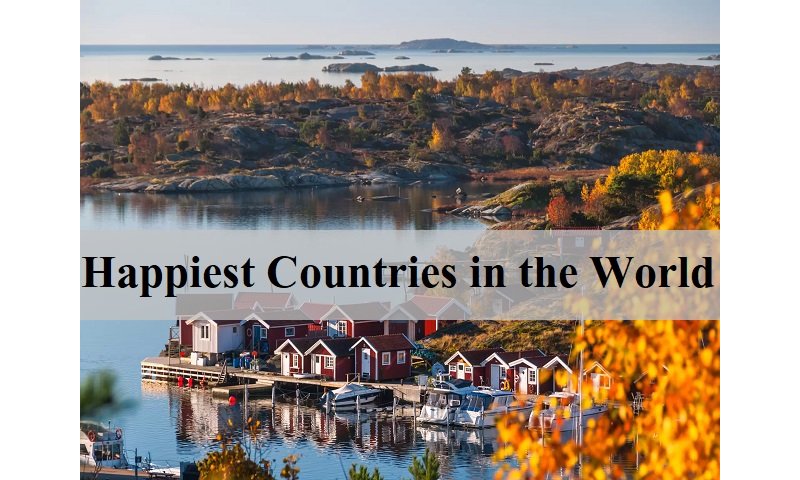Travel
Top 10 Happiest Countries in the World in 2024

What does a happy country mean? The World Happiness Report offers guidance to citizens on how to live happy and fulfilled lives.
Cold weather, gloomy winter days, and an absurdly high cost of living: who would ever want to live in such a place? That turns out to be the exact location on Earth where the happiest people can be found. Not because there is something in the frigid waters of this country of just 5.6 million people, Finland has taken the top spot in the United Nations World Happiness Report for the sixth consecutive year. Among the 143 countries and territories polled by Gallup World Poll, Finland is not the richest either; the GDP per capita of over 25 other nations surpasses that of Finland, though Nordic nations as a whole do well.
Happiest Countries Embrace Social Support
In a world shook by conflict, injustice, and political polarization, what does it even mean to be a happy nation? It’s commonly said that happiness can be found even in the darkest of circumstances, and the World Happiness Report provides ample evidence to support this belief. The researchers of the Sustainable Development Solutions Network, a nonprofit organization established by the United Nations to promote broader metrics of global health and happiness, have been showing repeatedly since the ranking’s inception in 2013 that the happiest nations have high levels of trust and are more crisis-resistant.
The report this year emphasizes that the post-COVID era is characterized by significant increases in altruism across all generations, but particularly among Millennials and Generation Z, who are more inclined than their forebears to assist those in need, according to the researchers.
However, the overall subjective sense of well-being in many nations varies significantly between the young and the old: “In some cases, these differences favor the old, as in the United States and Canada, where the rankings for those aged 60 and older are 50 or more places higher than for those under 30. In other cases, especially in Central and Eastern Europe, the reverse is true, with many rankings being more than 40 places higher for the young than for the old.”
Nordic Countries Head the Pack
As in the past, the Nordic nations continue to do well: Finland is at the top of the list, but Sweden, Denmark, the Netherlands, and Iceland are all highly ranked as well.
They differ from countries with lower scores in that they have support networks that can mitigate the effects of shocks. Residents of happy countries report higher life evaluations and more positive assessments of their own lives, whether through support for mental health and well-being or a strong sense of leaving a positive legacy for future generations through initiatives like the Sustainable Development Solutions Network. What precise combination of components makes someone happy? The original six critical factors that the researchers have consistently used in their report on global life satisfaction are high GDP per capita, social support during difficult times, lack of corruption in government, healthy life expectancy, freedom to make life decisions, generosity or charity toward others.
The happiness experts provide a wealth of detailed charts, graphs, and historical data in their 158-page study. Alternatively, you could just ask yourself this: how concerned would you be if you misplaced your wallet? It says a lot about how content you and those around you are to feel that a stranger, a police officer, or a neighbor would return it. Furthermore, it is a stronger indicator of personal happiness than financial status. As the report has shown time and time again, money cannot buy happiness.
1 | FINLAND🇫🇮
Finland succeeded once more. In 2018, it shot up to the top of the ranking from fifth place, and it appears committed to staying there. There are many advantages for Finns as well. This happy country has three million extremely relaxing saunas, a thriving cultural life, and high standards of living. Having more forests per square mile than any other country in Europe, a lot of Finns attribute their contentment with life to their relationship with the natural world.
The current happiness champion even gives advice on how to live a better life to the rest of the world, demonstrating that she is not selfish. Via its tourism organization, it suggests long walks in forests brimming with berries, mushrooms, and wild herbs, in addition to plenty of swimming, hiking, and biking. You live somewhere and you’ve never seen anything even slightly like that? They are urging you to come visit, and that is precisely the point.
2 | DENMARK🇩🇰
Denmark topped the list in the first report, in 2012, and again in 2013 and 2016, placing second for the sixth consecutive year. The authors of the report have previously observed that the social and political models and values of the Nordic countries are similar. That explains why they frequently alternate spots on the happiness podium and why each of them is listed among the top 10 happiest nations in the world.
In terms of environment, healthcare, and work-life balance, Danes do well. They also take great satisfaction in having one of the narrowest wealth disparities in the world; a society in which members equally share in the advantages and the disadvantages is, according to the report, a happier one.
3 | ICELAND🇮🇸
Numerous quality of life rankings consistently place Iceland at the top. This republic of about 390,000 people is also among the most environmentally friendly. It has been named the best country in the world for gender equality by the World Economic Forum and the most peaceful by the Institute for Economics and Peace for more than a decade. Iceland has the highest per capita publication rate as well: 10% of its citizens will aspire to write a book at some point in their lives, so it must truly bring them great joy.
Iceland has been ranked third in the world for happiness since 2022. Given its magical scenery, low taxation, free healthcare, and free education, it is hardly surprising that Iceland is so near the top of the UN happiness index.
4 | SWEDEN🇸🇪
Sweden moves up two spots from its previous ranking of number six in the happiness index. Sweden’s wealth, robust social networks, and the perception of its institutions’ integrity and accountability have all contributed to its continuous high ranking on the list. Enviable work-life balance is another feature of the Scandinavian nation, which offers the longest paid vacation period (41) of any nation in the world. Additionally, new parents can take up to 480 days of paid leave, during which they receive approximately 80% of their salary.
One drawback? The personal income tax rate is nearly 60%, which means that taxes are high. On the other hand, fiscal revenues fund free higher education, universal healthcare, and numerous social programs that assist individuals in acquiring new skills and utilizing employment opportunities.
5 | ISRAEL🇮🇱
Given the country’s ongoing conflict with Gaza, it may come as a surprise to learn that Israel is near the top of the UN Happiness Index. The explanation is straightforward: survey data from the last three years, namely 2021 through 2023, is averaged to determine the scoring for each country. However, when a crisis strikes, people tend to feel more empathy and solidarity among one another, which in turn raises happiness levels (as the Covid-19 pandemic has also demonstrated).
Furthermore, since the index was first made public ten years ago, Israel has never fallen below the fourteenth position. But how could this roughly ten million-person country, beset by hostile neighbors and embroiled in war all the time, really be so happy? The simple response is that happiness is not solely based on the existence or absence of a particular component. Israel is a wealthy and dynamic nation where individuals feel free to follow their own paths in life and can rely on solid community ties.
6 | THE NETHERLANDS🇳🇱
The Netherlands dropped one spot in this year’s ranking, but there are still very few grievances among its citizens. The Dutch have never been wealthier, more educated, or allowed to pursue their own interests in life.
The Happiness Report for this year emphasizes that only the Netherlands and Australia, with populations of more than 15 million, remain in the top 10, leaving out all of the world’s most populous countries. Surprisingly, the Netherlands had the smallest difference between the happiest and least happy people among the top 10 countries; in other words, the Dutch have relatively high and comparable levels of happiness.
7 | NORWAY🇳🇴
It’s a highly developed nation that also happens to be one of the most moral. According to Norwegians, social and economic equality should be upheld by democracy. Less disparity in wealth and gender, better access to free healthcare, and increased trust in political representatives are the outcomes. A person’s sense of personal well-being is greatly influenced by social and institutional trust, as the Covid-19 pandemic made abundantly clear. Norway has demonstrated notable success in reducing mortality rates and lessening the economic consequences of lockdowns.
Even though Norway’s ranking has been declining recently (it held the top spot in 2017), its social model is still unquestionably an incredible success story.
8 | LUXEMBOURG🇱🇺
Eight years ago, this land of lakes, rolling hills, and castles was ranked 20th in the world for happiness. In the report’s 2020 edition, Luxembourg placed among the top 10, and it has remained there ever since.
With a population of less than 700,000, this tiny country has above-average life expectancy, subjective well-being, social connections, and freedom of choice. Even though money cannot buy happiness, it certainly doesn’t hurt that Luxembourg is one of the richest nations in the world, with average gross monthly salaries of nearly 7,000 euros for workers.
9 | SWITZERLAND🇨🇭
Switzerland began to slip after taking the top spot in the 2015 World Happiness Report. It’s true that the Swiss are not unhappy, even though they may be feeling grumpier than normal.
Don’t worry, Switzerland is still a place where pursuing happiness seems to be the main goal. It can boast picture-perfect scenery, pure air, cutting-edge infrastructure and educational opportunities, as well as abundant wealth and equitable resource distribution. Making cheese and chocolate and avoiding conflict also helps: Reputably impartial, Switzerland has stayed out of conflicts since 1847. Alternatively, has it? Switzerland abruptly broke with its previous neutrality and joined the EU in slamming sanctions on Russia for its invasion of Ukraine.
10 | AUSTRALIA🇦🇺
For the first time since 2018, Australia has shot back up into the top 10 of the World Happiness Report. Though its overall life evaluation score of 7057 is lower than that of 7095 from the previous year, the improvement in the ranking can be ascribed to the even greater decline in New Zealand’s standing, which was 10th in 2023. According to the report, overall happiness is significantly lower in both situations among young people and rises gradually with age, peaking among older people.
Being one of the world’s ten happiest nations is still a pretty good ranking. Australians can truly be considered winners because of their high wages, high employment rate, long life expectancy, and exceptional altruism scores (approximately 40% of them are registered as volunteers).
-

 Business3 weeks ago
Business3 weeks agoNayef Doleh Examines International Humanitarian Fundraising Strategies
-

 Business3 weeks ago
Business3 weeks agoHow to fill MSME Form 1? Step-by-Step Guide
-

 Business4 weeks ago
Business4 weeks agoHow Black Banx is Redefining Global Banking Strategies in 2025
-

 Education4 weeks ago
Education4 weeks agoSchool Of Odd Thinkers – Think Odd, Learn a lot, and Earn a lot
-

 Tech4 weeks ago
Tech4 weeks agoMicrosoft Teams to End SMS Messaging Feature Support for Android Phones and Switch to Phone Link App as Alternative
-

 Festivals & Events3 weeks ago
Festivals & Events3 weeks agoInteresting Facts about St. Patrick’s Day
-

 Education4 weeks ago
Education4 weeks agoJeffrey Laino Offers a Close Look at Literary Analysis Implementation
-
Business3 weeks ago
From Marine to Chief: The Leadership Journey of Sean Mannix













